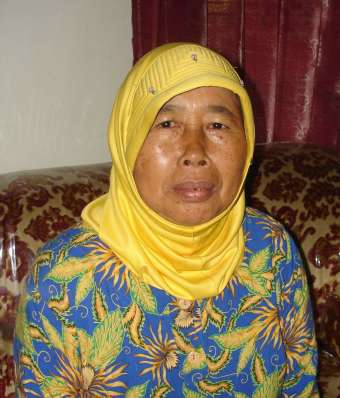Anne Dickson
A missed opportunity...
|
Masruhatin and Abdullah live on the northwest outskirts of the East Javanese city of Malang. Because they are respected Islamic leaders in their community, people often come to their home to ask for help or advice. Masruhatin has five adult children and her home is filled with her grandchildren’s laughter. Yet she feels her family is incomplete. Despite years of urging, and Masruhatin’s offers to broker another relationship, Abdullah continues to refuse to entertain any thought of taking a second wife. So, much to Masruhatin’s disappointment, they remain a monogamous couple.
She says...
Since Allah knows best, and He allows husbands to marry up to four wives, polygamy must be a good, useful practice. If a husband wants to take another wife, Masruhatin believes that the first wife should understand her husband’s sexual needs and support him in his decision to do so. She idealises her vision of a society where polygamy is common: ‘There would be no adultery – the community would be healthier.’
According to Masruhatin, polygamy has other benefits too. She believes that there are more women than men in Indonesia and that polygamy is necessary to ensure that every woman has the opportunity to get married. If Indonesian men chose poor widows as their subsequent wives, following the example of Muhammad, they’d be performing a form of social service. Masruhatin also argues that more wives also means more babies, which means more members of the Muslim community. She feels that if her husband would agree to take another wife, their family would be better able to contribute to Muhammad’s pride when he sees the vast numbers of Islam’s followers on Judgement Day.
He says...
The practice of polygamy is appropriate in certain circumstances and it does offer a solution to the perceived imbalance in the ratio of women to men in Indonesia. However, Abdullah’s views on the suitability of polygamy as a widespread practice are quite different from those of his wife.
Monogamy has always been Abdullah’s personal preference. His experiences over the years have convinced him that most people aren’t capable of making polygamy work. To illustrate his point, Abdullah tells stories of people who have sought his advice about polygamy-related issues. In one case, a woman came to his door in tears having discovered that her husband had taken a second wife. He has also counselled a man and his first wife – separately – about their problems dealing with a demanding and inflexible second wife.
Reflecting on his observations of the problems of polygamous families, Abdullah has decided that monogamy is the ideal form of marriage. After all, he explains, Islam aims for peace in lives and relationships. Since polygamy often creates family disharmony and financial stress, he thinks that monogamy is more likely to achieve this aim in family life.
A controversial topic
Polygamy is not just a controversial topic in this particular household. It is an issue which brings out strong feelings all over Indonesia, a country where limited polygamy is permitted under national law. For example, there was widespread debate and outcry when charismatic Islamic preacher Aa Gym announced his second marriage in December 2006. On one hand, this case triggered renewed calls for Indonesia’s laws concerning polygamy to be tightened further. Meanwhile, others claim that restricting polygamy is unconstitutional as it impinges on the right of people to practise their religion freely.
Some women defend Aa Gym’s actions, pointing out that he has the freedom to take a second wife if he chooses – he hasn’t broken any rules. Many, however, are disappointed – some even outraged – that Aa Gym has taken a second wife. They pity his first wife, Teh Ninih, and believe that she gave her formal approval for the marriage because she had no real choice. Women’s support for Teh Ninih is demonstrated by the fact that she has since emerged as a public figure in her own right, a source of spiritual guidance.
In thinking about polygamy, many women experience a tension between their religious convictions and their beliefs about the roles of men and women on one hand, and their ‘gut’ reaction and observation of polygamous marriages on the other.
Monogamy has always been Abdullah’s personal preference.
For women who are staunch supporters of polygamy like Masruhatin, their religious convictions lead them to believe their husbands should take other wives. But most Muslim women display at least some unease at the thought of their husbands taking another wife. Some women would only be willing to accept another wife under certain circumstances, such as if they were infertile or unable due to sickness to fulfil their duties as wives. Others oppose polygamy in all circumstances.
There are certainly a wide variety of attitudes towards polygamy among Muslims in Indonesia. And as the example of Masruhatin and Abdullah shows, we cannot make assumptions about how individuals think about this issue. There are plenty of men who never want to take another wife – and there are also women who wish their husbands would. ii
Anne Dickson (annedickson_86@yahoo.com.au ) has just finished her degree in Indonesian Studies and Linguistics at the University of New South Wales. She did research on polygamy while in Malang on the ACICIS program.
